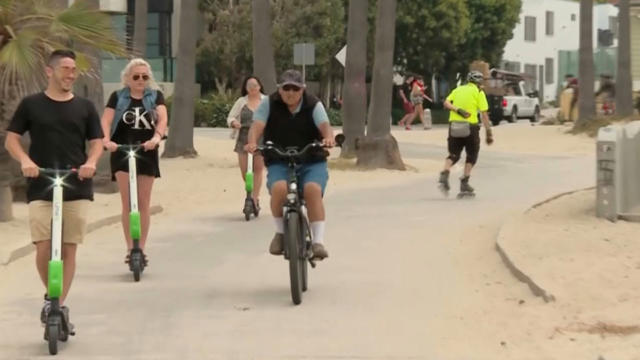The rental electric kick scooter first gained popularity in southern California, where the company Bird launched dockless units that can be unlocked and tracked by smartphone. Electric bike rental companies Spin and LimeBike soon joined the competition.
But love turned to hate when the three competitors hit San Francisco. Social media posts slammed riders for littering the streets with scooters.
“They didn’t train users how to actually park these scooters, so they were strewn all over the place, in the middle of the sidewalk, obstructing pedestrians, especially people in wheelchairs. Some of them ended up getting thrown into the bay,” said Josh Constine, TechCrunch Editor-At-Large.
That’s why the city of San Francisco placed a temporary ban on the scooters, so riders can now only find a few stray scooters that are likely no longer functioning.
“Just the fact that you can take them anywhere in the city, it’s extremely important to me and I hope they come back,” said one rider.
San Francisco says it will soon select five companies that combined will initially be allowed to deploy 1,250 scooters. Twelve companies applied, including Bird, even Uber – via its acquired bike-rental company Jump — LimeBike, Chinese bike company Ofo, and another San Francisco company called Scoot.
“Just because there’s an app for something, doesn’t mean it’s safe and legal. What people did is they started riding them up and down the sidewalks because San Francisco streets aren’t really set up for that type of vehicle right now. That created a threat to pedestrians,” said Michael Keating, Scoot Founder and CEO.
Scoot hopes it has an advantage over the competition because it’s played by the rules. It’s refrained from launching its kick scooters until getting city approval. And in launching their shared electric motor scooter six years ago in San Francisco and its electric bikes in Barcelona, Scoot has emphasized and tracked rider responsibility.
“Every city in the world is going to have light electric vehicles that you can just pick up and grab and drive yourself wherever you need to go. Some of those are going to be stand-on scooters, some of those are going to be electric bicycles, some are going to be motorbikes like we have and some are going to be electric cars. Our business is to make a platform that makes it possible for folks to access whichever of those vehicles they need in whatever city they are in,” Keating said.
Investors are going crazy over the last-mile transport vehicle with Bird having raised hundreds of millions of dollars at a billion dollar valuation.
“I don’t think billion dollar valuations for scooter companies are that crazy. When you think of scooters being a piece of the puzzle for transportation alongside bikes, car ownership, ride-share like Uber and public transportation, really it’s the idea that the valuation of scooter companies are catching up to all these other pieces of the puzzle,” Constine said.
Safety could also be another key to growth. California law actually requires riders to wear a helmet, but right now you’ll be hard-pressed to find anyone heeding that advice.
 CGTN America
CGTN America

